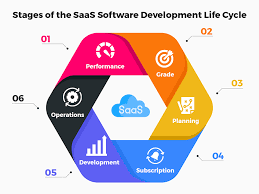The Importance of Enterprise Web Application Development
In today’s digital age, enterprise web applications play a crucial role in the success of businesses. These applications are designed to meet the specific needs of an organization and streamline its operations. From customer relationship management systems to project management tools, enterprise web applications are essential for improving efficiency, productivity, and overall business performance.
One of the key benefits of enterprise web applications is their ability to centralize data and processes. By having all information stored in a secure online platform, employees can access real-time data from anywhere, at any time. This leads to better decision-making and collaboration among team members, ultimately driving business growth.
Security is another critical aspect of enterprise web application development. With cyber threats on the rise, it is imperative for businesses to protect their sensitive data. Enterprise web applications are built with robust security measures to safeguard against potential breaches and ensure data integrity.
Scalability is also a significant advantage of enterprise web applications. As businesses grow and evolve, their software needs may change. Enterprise web applications are designed to be scalable, allowing organizations to easily expand their functionalities and accommodate increasing user demands without compromising performance.
In conclusion, enterprise web application development is essential for modern businesses looking to stay competitive in today’s fast-paced market. By investing in custom-built solutions tailored to their unique requirements, organizations can enhance operational efficiency, improve data security, and adapt to changing business needs effectively.
7 Essential Tips for Successful Enterprise Web Application Development
- Plan and design the architecture carefully before starting development.
- Use scalable and reliable technologies to ensure long-term success.
- Implement proper security measures to protect sensitive data.
- Optimize performance by minimizing server requests and using caching techniques.
- Follow coding standards and best practices for maintainable codebase.
- Regularly test the application for bugs, vulnerabilities, and compatibility issues.
- Provide thorough documentation for easier maintenance and future updates.
Plan and design the architecture carefully before starting development.
When embarking on enterprise web application development, it is crucial to meticulously plan and design the architecture before commencing the development process. Careful consideration of the application’s architecture ensures that the foundation is solid and aligns with the organization’s objectives. By mapping out the architecture in advance, developers can identify potential challenges, establish clear workflows, and optimize performance. This strategic approach not only streamlines the development process but also lays the groundwork for a scalable and efficient enterprise web application that meets the business’s specific needs.
Use scalable and reliable technologies to ensure long-term success.
Using scalable and reliable technologies is crucial for ensuring the long-term success of enterprise web application development. By leveraging technologies that can grow alongside your business and maintain consistent performance under varying workloads, you can future-proof your applications and minimize the risk of disruptions. Scalable technologies allow your web applications to adapt to changing demands without compromising efficiency, while reliable technologies ensure consistent functionality and data integrity. By prioritizing scalability and reliability in technology choices, businesses can lay a strong foundation for sustained growth and success in the digital landscape.
Implement proper security measures to protect sensitive data.
Implementing proper security measures to protect sensitive data is paramount in enterprise web application development. With the increasing number of cyber threats, safeguarding confidential information is crucial to maintaining the trust of customers and stakeholders. By incorporating robust encryption protocols, access controls, and regular security audits, organizations can mitigate the risk of data breaches and ensure data integrity. Prioritizing security not only protects sensitive information but also enhances the overall reliability and credibility of the enterprise web application.
Optimize performance by minimizing server requests and using caching techniques.
To optimize performance in enterprise web application development, it is crucial to minimize server requests and implement caching techniques effectively. By reducing the number of server requests, the application can load faster and provide a seamless user experience. Caching techniques such as storing frequently accessed data locally can further enhance performance by reducing load times and improving overall responsiveness. Implementing these strategies not only boosts the efficiency of the application but also contributes to a more satisfying user experience.
Follow coding standards and best practices for maintainable codebase.
Following coding standards and best practices is crucial in enterprise web application development to maintain a clean and sustainable codebase. By adhering to established guidelines, developers ensure consistency across the project, making it easier for team members to understand and collaborate on the code. This approach not only enhances code readability but also facilitates future maintenance and scalability of the application. Consistent coding standards promote efficient debugging, reduce errors, and ultimately contribute to a more robust and maintainable codebase that aligns with industry best practices.
Regularly test the application for bugs, vulnerabilities, and compatibility issues.
Regularly testing enterprise web applications for bugs, vulnerabilities, and compatibility issues is crucial for ensuring their optimal performance and security. By conducting thorough and consistent testing, developers can identify and address any potential weaknesses or issues before they impact the system’s functionality or compromise sensitive data. This proactive approach not only helps maintain the application’s reliability but also enhances user experience and minimizes the risk of cyber threats, ultimately contributing to the overall success of the enterprise.
Provide thorough documentation for easier maintenance and future updates.
Providing thorough documentation for enterprise web application development is crucial for ensuring easier maintenance and future updates. Comprehensive documentation serves as a roadmap for developers, allowing them to understand the codebase, functionalities, and dependencies of the application. This not only streamlines the troubleshooting process but also facilitates seamless updates and enhancements in the future. By documenting every aspect of the development process, businesses can ensure continuity in their web applications and empower their development teams to make informed decisions for ongoing maintenance and improvements.




